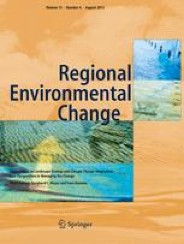How do countries frame climate change? A global comparison of adaptation and mitigation in UNFCCC National Communications
Abstract
Self-reporting is an important mechanism of the UNFCCC to collect information about what countries are doing to achieve their climate change mitigation and adaptation targets and how much progress has been made. Here we empirically test four hypotheses about what countries prioritise in their self-reporting through the National Communications. Using quantitative text analysis methods (structural topic modelling and keyness statistics), we analyse over 600 submissions (from 1994 to 2019) and find evidence that vulnerable countries highlight impacts, vulnerability, and adaptation rather than mitigation targets, whereas high-emitting countries tend to focus their messaging more on mitigation. Despite the Paris Agreement being considered a ``watershed moment’’, we find no statistically significant increase in focus on climate solutions post-Paris, and no significant increase in attention to adaptation. Our global assessment and the methods used offer a novel perspective to understand what gets framed as important by governments. Finally, we provide reflections on how self-reporting mechanisms can be used for global stocktaking of progress on climate action.
Download full text in pdf format
 Published as:
Published as:
S.J.Wright,
A. Sietsma,
S. Korswagen,
I. N. Athanasiadis,
R. Biesbroek,
How do countries frame climate change? A global comparison of adaptation and mitigation in UNFCCC National Communications,
Regional Environmental Change, 23:129,
2023, doi:10.1007/s10113-023-02113-3.
You might also enjoy (View all publications)
- CY-Bench: A comprehensive benchmark dataset for sub-national crop yield forecasting
- Hybrid phenology modeling for predicting temperature effects on tree dormancy
- To measure or not: A cost-sensitive, selective measuring environment for agricultural management decisions with reinforcement learning
